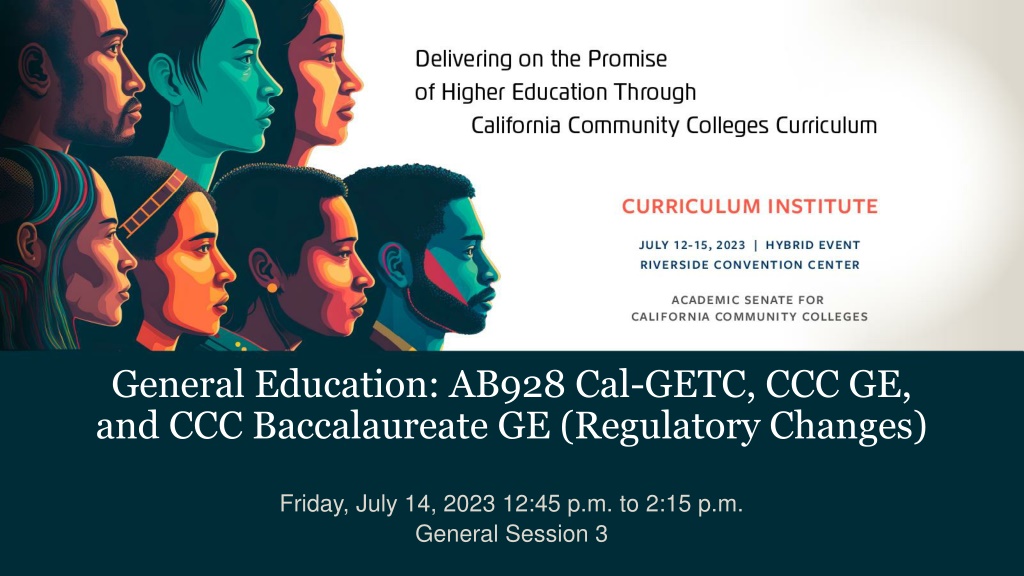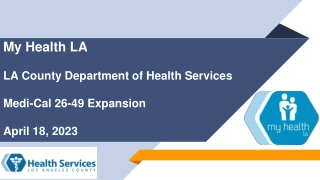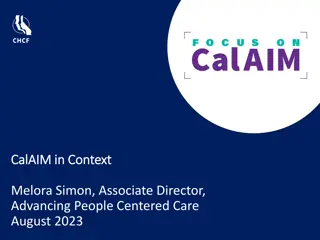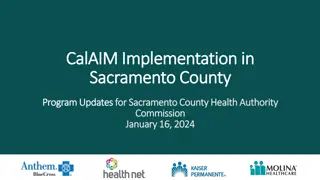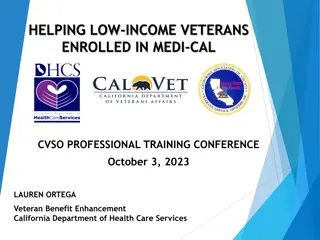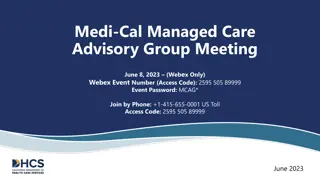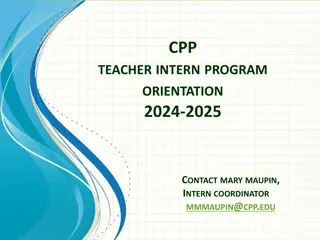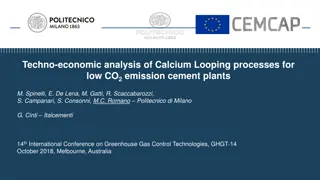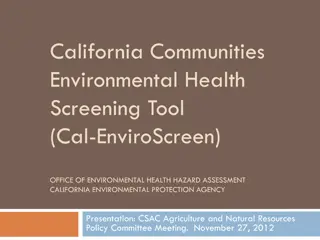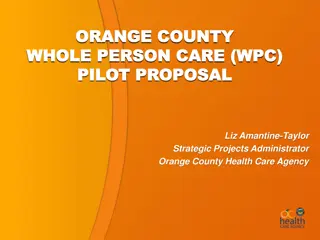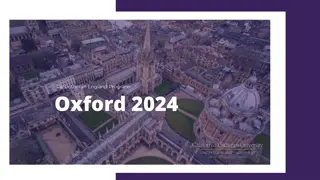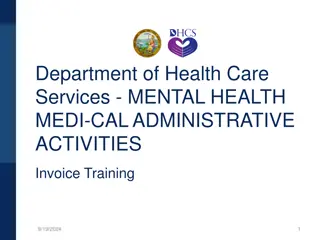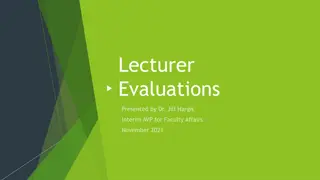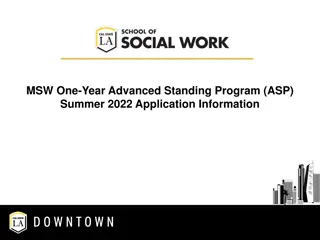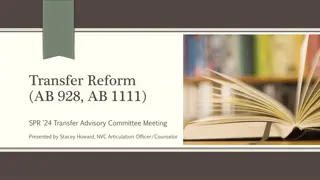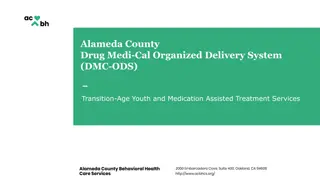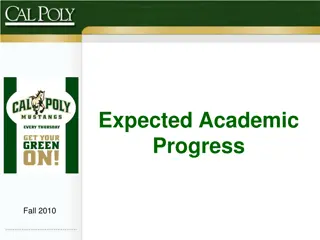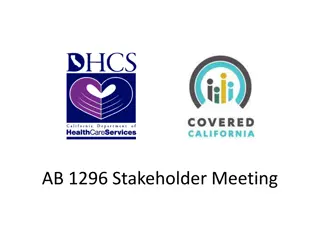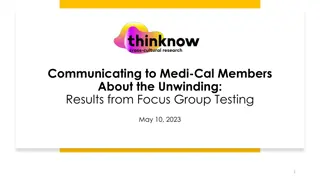Understanding General Education Changes: AB928, Cal-GETC, and More
Explore the regulatory changes in general education, including AB928, Cal-GETC, and CCC Baccalaureate GE, and learn about the impact on transfer pathways, faculty roles, and curriculum requirements. Delve into the historical development of general education and discover the significance of aligning GE patterns for transfer. Gain insights into the purpose of general education and the challenges and opportunities faced by colleges and students in adapting to these changes.
Download Presentation

Please find below an Image/Link to download the presentation.
The content on the website is provided AS IS for your information and personal use only. It may not be sold, licensed, or shared on other websites without obtaining consent from the author. Download presentation by click this link. If you encounter any issues during the download, it is possible that the publisher has removed the file from their server.
E N D
Presentation Transcript
General Education: AB928 Cal-GETC, CCC GE, and CCC Baccalaureate GE (Regulatory Changes) Friday, July 14, 2023 12:45 p.m. to 2:15 p.m. General Session 3
PRESENTERS Ginni May, Sacramento City College, ASCCC Past President LaTonya Parker Ed. D., Moreno Valley College, ASCCC Secretary Erik Shearer, Butte College, Vice President of Instruction
DESCRIPTION The requirement by AB 928 (Berman, 2021) for a singular lower division general education pathway for transfer to both UC and CSU has amplified faculty, student, and the public s voices relative to streamlining transfer pathways and general education. The new Ethnic Studies requirements for transfer (CSU General Education Area F/UC Area 7) and legislative mandates for a single standard California General Education (GE) Transfer Curriculum (CalGETC), have made GE a hot topic on our campuses. Come learn updated information regarding faculty roles in General Education (GE), regulatory changes and how Academic Senates and Curriculum Committees should be involved in the process given that curriculum and degree requirements are key components of the 10+1.
AGENDA Purpose of General Education Current GE patterns used for transfer Why align GE patterns/pathways? Cal-GETC Proposed alignment of CCC Associate Degree GE Proposed alignment of CCC Baccalaureate Degree GE Opportunities and challenges for colleges and students Title 5 Updates
Purpose of General Education Title 5 55061 Philosophy and Criteria for Associate Degree and General Education General Education is designed to introduce students to the variety of means through which people comprehend the modern world. It reflects the conviction of colleges that those who receive their degrees must possess in common certain basic principles, concepts and methodologies both unique to and shared by the various disciplines. College educated persons must be able to use this knowledge when evaluating and appreciating the physical environment, the culture, and the society in which they live. Most importantly, General Education should lead to better self-understanding.
Historical Development of GE Origins in the educational reforms that started late 1800s / early 1900s. Introduction of elective curriculum and rise of concentration / elective systems. Liberal Education vs. Specialization General Education as the liberal education core to ensure balance for academic and career specialization for students. 1940 1970s: codification of general education as a common intellectual experience for all students. GE courses are conceived of as courses outside of discipline requirements. Tension between discipline specialization vs. GE. 1970s to today: back and forth, particularly in the community colleges as career specialization gained traction Has never been a static thing, but current changes are most significant in decades
Current General Education Patterns GE Patterns Not Aligned CSU GE Breadth (39 semester units) IGETC (34 semester units) IGETC for STEM (34 semester units with some units taken after transfer) General Education for Associate Degree with Additional Requirements (competency, graduation) (18+ semester units ) Baccalaureate Degree Lower Division General Education (uses CSU GE Breadth or IGETC) (34-39 units)
Why Align GE Patterns/Pathways? Required by AB 928 for transfer to CSU and UC Simplify transfer preparation Reduce chances that students take wrong courses i.e. course counted for GE in one pattern/pathway but not another Make transfer process easier to navigate Create a student-centered transfer process Ensure more students arrive at CSU/UC ready to succeed
California General Education Transfer Curriculum (Cal-GETC): AB 928 (Berman, 2021) Singular lower division general education pathway agreement by December 31, 2023 and implementation by 2025-2026. Only lower division GE pathway to determine transfer eligibility to both the CSU and UC systems GE pathway to include no more units than those required under the current IGETC pattern as of July 31, 2021 34 semester units The Intersegmental Committee of the Academic Senates (ICAS) shall establish the GE pathway by May 31, 2023 IF NOT administrative bodies of the CCC, CSU, and UC systems shall establish the GE pathway by December 31, 2023.
Cal-GETC: The Process Spring 2022 Special Committee on AB 928 formed 9 ICAS voting members Additional advisory members: students, administrators, articulation officers, Executive Directors Current GE pathways compared for common course areas Minimum required units limited to 34 semester units Courses must meet both CSU and UC requirements Recommendation sent to ICAS for Cal-GETC ICAS recommended for field vetting of proposed Cal-GETC: June 2022-October 2022 Vetting among faculty through academic senates in each of the three segments: CCC, CSU, UC
Cal-GETC: The Process 2 All three segment academic senates endorsed Cal-GETC: CCC: resolution to provide opportunities to CCC students to take LLSD courses CSU: resolution to require significant input from segment academic senates for Cal-GETC modifications UC: approved Cal-GETC in Senate Regulation 479 ICAS established framework on February 1, 2023 ICAS created Cal-GETC Standards and approved first Cal-GETC Standards version 1.0 on May 22, 2023 More work to take place on Cal-GETC Standards document for Areas 2-5 during fall 2023 to create Cal-GETC Standards version 1.1.
Cal-GETC 2 Area Subject Courses (minimum 3 semester/4 quarter units) 1 English Communication English Composition Critical Thinking and Composition Oral Communication Mathematical Concepts and Quantitative Reasoning Arts and Humanities Arts Humanities Social and Behavioral Sciences Two disciplines Physical and Biological Sciences Physical Science Biological Science Laboratory (for physical or biological science course) Ethnic Studies 1 course 1 course 1 course 1 course 2 3 1 course 1 course 4 2 courses 5 1 course 1 course (1 unit) 1 course 6 Total Courses (units) 11 courses (34 semester units)
Cal-GETC: Differences from other GE Patterns Oral communication included; adjustments to CCC courses required Arts and Humanities Area limited to two courses Behavioral and Social Sciences Area limited to two courses Lifelong Learning and Self-Development not included Ethnic Studies included
Proposed Alignment of CCC GE with Cal-GETC 5C 5C is responsible for the development and revision of all title 5 regulations related to curriculum and instruction, the periodic revision of the Program and Course Approval Handbook, the Baccalaureate Degrees Handbook, and all other recommendations that require approval by the Board of Governors. In formulating its recommendations to the Board of Governors, the 5C shall consult with all appropriate constituencies, and shall rely on the advice and judgment of the Academic Senate. 2022-2023 Associate Degree Regulations Workgroup Formed Reviewed and amended SECTIONS 55060, 55061, and 55062 OF DIVISION 6 OF TITLE 5 OF THE CALIFORNIA CODE OF REGULATIONS
Proposed Alignment of CCC GE with Cal-GETC ASCCC In collaboration with 5C, recommended simplification of associate degree requirements: Align GE with Cal-GETC, although not identical Include equivalent requirements as current associate degree requirements Eliminate complications regarding competency requirements Provided feedback to CCCCO and 5C Resolution F22 07.01 for the ASCCC to work with the CCCCO to amend regulations on associate degree to align with Cal-GETC Resolution S23 06.05 for the ASCCC to support revised associate degree requirements
Proposed Alignment of CCC GE with Cal-GETC (fall 2022)
Summary of Changes to t5 Associate Degree Regs Overall: Shorten regs to clarify distinctions among degree standards and criteria, constructing and approving a local degree, and how a student earns an AA/AS 55060 Philosophy and Criteria for Associate Degrees and Gen Ed. 55061 Associate Degree Requirements How you build and approve through the curriculum process. Includes new Gen Ed categories. Clarifies the definition of area of emphasis. 55062 Requirements for Awarding an Associates Degree Residency changed from College to District Includes use of noncredit to satisfy requirements (from old 55064) Allows colleges to compute a minimum 2.0 GPA by excluding courses not used to satisfy degree requirements. Includes new language re: meeting GE requirements through previous baccalaureate degree completion.
New GE for CCC Baccalaureate
Proposed CCC Baccalaureate Lower Division Degree GE ACCJC currently requires 36 units of GE for CCC baccalaureate degree students (27 lower division; 9 upper division) Students are currently required to follow IGETC or CSU GE (which are being replaced by Cal-GETC) The proposed GE pathway: Helps address the challenge of high-unit technical degree programs May be more appropriate for our baccalaureate degree students (in terms of structure of pattern and area criteria) Would allow for increased flexibility for local approval of courses
(proposal consideration) Baccalaureate Degree Lower Division GE Pathway Area Subject Courses (minimum 3 semester/4 quarter units) 1 English Communication, Oral Communication, and Critical Thinking English Composition Oral Communication and Critical Thinking Mathematical Concepts and Quantitative Reasoning Arts and Humanities Social and Behavioral Sciences Natural Sciences Ethnic Studies Lifelong Learning and Self-Development Two additional courses from any two areas above Courses must be transfer-level courses. *Exceptions: Students in career technical programs seeking a certificate or associate degree with specific requirements, as dictated by the program s advisory or accrediting body, that cannot be satisfied with transfer-level coursework. See EDC 78213 1 course 1 course 1 course* 1 course 1 course 1 course 1 course optional 2 courses 9 courses (27 semester units) 2 3 4 5 6 7 Total Courses (units)
Opportunities and Challenges for Colleges and Students Opportunities: Clear GE pathway to both CSU and UC Students meeting GPA requirements will be prepared for transfer to both CSU and UC For local associate degrees, colleges may include additional areas All associate degree requirements will be GE or majors; no competency or additional graduation requirements needed Challenges: All transfer students will need to take courses meeting UC course standard requirements, even if transferring to CSU Reduced options for students Fewer courses are UC transferable or approved for GE/majors requirements than at CSU
A sampling ofCourses meeting CSU GE Breadth but not IGETC Trigonometry Math for Teachers Personal Finance Career Exploration and Life Planning College Success Strategies Health Science Nutrition Introduction to Kinesiology Foundation of Fitness and Wellness Reading for Academic and Lifelong Literacy Introduction to Career Exploration Human Reproduction and Sexuality MORE
